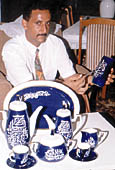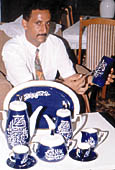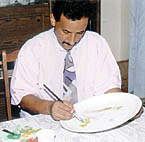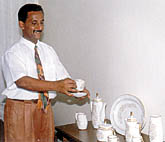
CERAMICS: Waiting to Make an Economic Contribution [Archives:1999/05/Last Page]
February 1 1999

Yemen Times Aden Bureau, seeking to explore the world of ceramics, met one of its most famous artists in Yemen, Ali Baras. Ali is a co-founder of the Formative Artists Association.
Excerpts:
Q: How did you discover your artistic talent?
A: When I was a pupil at the elementary level, I had great interest in arts, especially drawing. My family and teachers discovered I had a gift. It just developed instinctively with time.

Q: Did you get professional training?
A: I studied at the Applied Arts College in Russia specializing in ceramics. I got an MA degree. I then joined a one-year refinement course in applied arts at Russia’s educational arts college. That was followed by real work for another year in a pottery factory.
Q: What is your present occupation?
A: I am a specialized teacher at the Aden Higher Institute for Teachers and I teach fine arts and artistic education.
Q: How developed is the art of ceramics – worldwide and in Yemen?
A: The word ceramic is an ancient Greek word. It refers to the art of pottery. It was a manual craft in the old times, and its objective was to meet people’s needs.
With time, pots that were made of clay, were decorated with various shapes and colors. The industry developed greatly over the years.
Today, machines do most of the work. The industry also branched out from simple clay to various thermal, glass, electrical appliances, tiles and decor fields. Let me stress, however, that it is human talent and imagination that drives the machines in their creation of the final product.

A: Frankly, there is no care or attention by either the government, represented by the Culture or the Education Ministries, or the general public.
The government’s interest is aroused only when there is a certain festivity or occasion and they invite us to attend. This means that our officials are show-oriented.
The general public’s interest is driven by market conditions.
Q: What does the future look like? And what is your role?
A: As far as the future is concerned, I think we will simply muddle through. As for me, I plan to start classes to teach the art of pottery. I hope to be able to establish a workshop in this field. I plan to draw expertise from schools, institutes and universities.
We will give theoretical lessons and practical training. I am now working on a manual that gives a step-buy-step direction on how to use mud, sand and clay to make various forms.
Q: What can be done to help you in these efforts?
A: I appeal to the authorities to pay more attention to this art in view of its importance – as a socio-cultural heritage and because of its economic benefits. We can start a major activity that ties in with the tourism business as well as with cottage industry.
The many small-scale project financing schemes in our country today should consider providing support and credit for our efforts. I also hope that some foreign aid can be channelled to our Formative Arts Association, which is an NGO.
I hope someone out there is taking note to help develop this beautiful art in Yemen.
——
[archive-e:05-v:1999-y:1999-d:1999-02-01-p:./1999/iss05/lastpage.htm]


